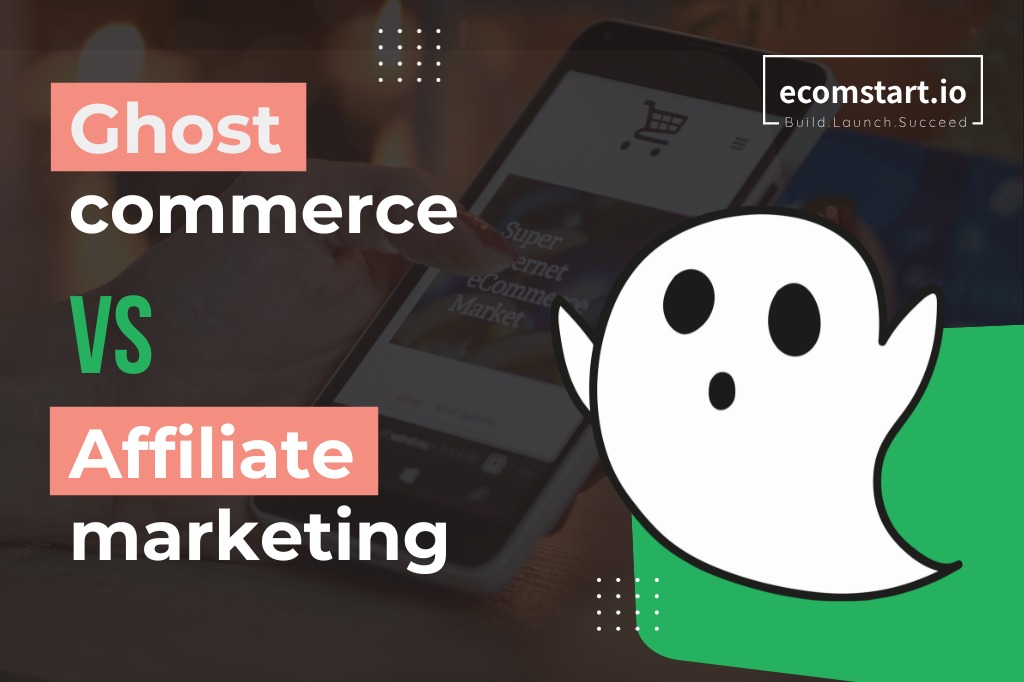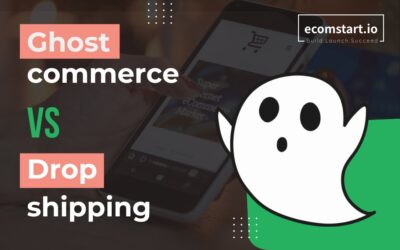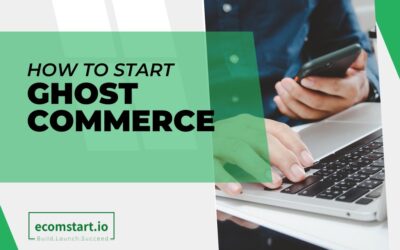
In recent years, the term “ghost commerce” has been in bloom as a trend. The rapid rise of TikTok has more or less brought ghost commerce to a wider audience, especially those looking for a money-making alternative beyond familiar options like dropshipping or affiliate marketing.
Some online resources define ghost commerce as a method to make money by promoting and selling products without needing a physical inventory or a traditional eCommerce store. All you need is to leverage your online presence, typically through social media channels or blogs, to guide people to buy from other retailers or eCommerce platforms. So, isn’t that just affiliate marketing?
You must be so messed up with such definitions. I knew it because I had been there too. If you’ve read a bunch of blog posts and watched a bunch of videos but still can’t grasp what ghost commerce is and how it differs from affiliate marketing, then this blog post is for you.
In this post, we’ll first explain the basics of two terms: ghost commerce vs affiliate marketing. Then, we’ll look closely at how they differ based on these criteria:
- Product ownership
- Brand building
- Logistics and customer service
- Entry barriers (technology, startup cost,..)
- Scalability
No further ado, let’s begin.
Contents
1. Ghost commerce vs affiliate marketing: A comparative overview
Before going into details, let’s take a look at the table below that summarizes the key differences between ghost commerce and affiliate marketing.
| Ghost commerce | Affiliate marketing | |
| Definition | – Businesses leverage their online presence to sell products or services that match their established brand and target customers. | – Businesses promote products or services from other brands in their content, such as blog posts, and incorporate affiliate links with tracking codes in the content. Once a user clicks on those links and completes a specific action, they’ll earn a commission. |
| Product ownership | – Sellers don’t own the products themselves. – Sellers’ perceived ownership of the product increases when done right. | – Sellers don’t physically own the products. |
| Brand building | – More control over the brand | – Little control over the brand |
| Logistics & customer service | – More responsibility for logistics & customer service | – No control over order fulfillment and customer service |
| Entry barriers | – Higher investments – Technical skills required – Slower early growth | – Lower profits – Slower, indirect growth through partnerships |
| Scalability | – Great scalability control | – Reliance on many factors outside of your control. |
2. What’s the difference between ghost commerce and affiliate marketing?
2.1. Understand ghost commerce

So what is ghost commerce? Unlike the typical business models where entrepreneurs begin with a product and build the brand around it, ghost commerce sellers start by building an online presence and a follower base.
Once their brand has become solid, they work with dropshipping suppliers to select and sell products that properly align with their brand and resonate with their followers. Sellers even can customize the existing products or create new ones that reflect their brand; of course, it comes with extra costs.
With dropshipping and print-on-demand services, there’s no need for a physical inventory. These third-party services handle manufacturing, storage, and order fulfillment, letting ghost commerce sellers focus on building their brands and implementing marketing efforts.
While the term “ghost commerce” sounds so strange at first, many of us have probably known this business model.
Celebrities and influencers make money with ghost commerce. They often leverage their reputation & influence and collaborate with reliable suppliers to offer product lines that match their brand and their followers.
2.2. Understand affiliate marketing

Affiliate marketing has now become too familiar to most of us. As more people rush into it for passive income, content consumers like us have likely come across it somewhere before.
You can see affiliate marketing in plain sight everywhere: a blog post, a Youtuber video, a Facebook post, or a simply link under relevant social posts. The catch is rather simple: acting as a third-party sharing a product/service that the blog writers, Youtuber, Facebook usesr endorse. To monitor how this type of promotion performs, an affiliate tracking platform is used to generate unique tracking code built into the shared link.
Once a user clicks on the affiliate links and makes a purchase (or takes a specific action like downloading an app or registering for a webinar), the affiliate earns a commission from that sale. The amount they earn depends on how popular they are, the products or services they promote, and the company they partner with.
This is a money-making way without the need for a physical inventory, a full-fledged online store, and brand development.
2.3. Is Ghost eCommerce the same as affiliate marketing?
While ghost commerce and affiliate marketing share similarities, such as not requiring an inventory, they are different business models with different orientations and profit approaches.
Ghost commerce focuses on building your own brand and leveraging the brand to sell your products or services. On the other hand, affiliate marketing is about promoting products or services from other companies.
As a ghost commerce seller, you can adjust your earnings and keep the full profit margin on the products. In contrast, as an affiliate, the commission you earn per sale is typically fixed and lower than selling your own offerings.
This core difference between ghost commerce vs affiliate marketing affects various aspects, such as product ownership, branding, logistics, customer service, scalability, and entry barriers. We’ll explore these aspects in the next part.
| You may be interested: Ghost commerce vs dropshipping: What’s the differences? |
3. Ghost commerce vs affiliate marketing: A deep dive into every aspect
3.1. Product ownership

3.1.1. Ghost commerce
In Ghost Commerce, you don’t own the products themselves. Often, dropshipping suppliers handle product manufacturing, storage, inventory, and fulfillment.
That said, you have the freedom to choose products that fit your brand and resonate with your customers.
When every offering reflects your brand, customers are likely to perceive that you’re the creator and owner of these products, not just selecting them from other suppliers. As a result, it gives you a sense of ownership over the products you sell, even though you don’t physically own them.
So what happens to product ownership when you customize or create products for your brand? Generally, the physical ownership stays with the supplier, but you may own the intellectual property rights for the specific changes or designs.
3.1.2. Affiliate marketing
As an affiliate marketing business, you have much less control over products compared to ghost commerce. You can’t influence how products are manufactured, stored, picked, packed, or shipped to customers. Customizing products or ensuring a personalized customer experience during their buying journey is nearly impossible.
What you can influence the product is to persuade customers to click on your affiliate links and make a purchase with compelling content. That being said, your content should communicate the core value proposition defined by the original brand.
In a nutshell, the ownership over the product belongs to the suppliers, not affiliates.
3.2. Brand building

3.2.1. Ghost commerce
As aforementioned, ghost commerce entrepreneurs focus on building their brands as the key to success. So you’re free to choose elements like the brand name, logo, tone of voice, and visual style that represent who you are and your values.
Also, you can ensure brand consistency across touchpoints, such as websites, blogs, social media, YouTube, packages, shipping notes, etc. In addition, you’re able to pick or even customize products that match your brand and target customers.
3.2.2. Affiliate marketing
Unlike ghost commerce, where you build and sell your own brand, affiliate marketing involves promoting other brands. Therefore, the voice and message conveyed in your content must reflect the brand of the companies you’re promoting, not your own.
In short, you have little control over anything related to the brand.
3.3. Logistics and customer service

3.3.1. Ghost commerce
When it comes to logistics and customer service, as a ghost commerce seller, you have great control over the whole process.
You can decide on trustworthy partners for order fulfillment. It’s possible to ask them to tailor the package or shipping labels to match your brand. You can keep track of the inventory levels and collaborate closely with logistics partners to address any issues that may arise during order fulfillment.
For customer service, you deal directly with customers and handle inquiries, complaints, and returns. This ensures consistent service quality and brand coherence.
3.3.2. Affiliate marketing
In affiliate marketing, the brand manages everything related to logistics—choosing suppliers, packaging, shipping timelines, and customer interaction. As an affiliate, you have little direct control over these aspects.
What you can do is select trustworthy brands with a proven track record of fulfilling orders promptly and accurately. Be transparent about any limitations before users click on affiliate links to make a purchase. This ensures a positive buying experience for them and enhances your credibility.
3.4. Entry barriers (technology, startup cost,..)

3.4.1. Ghost commerce
As mentioned earlier, in ghost commerce, you build your brand and partner with dropshipping suppliers to sell fitting products. It requires time, money, and some technical know-how. Specifically, you’ll have to:
- Learn everything about brand building and how to analyze data using tracking tools.
- Set up an online store using eCommerce platforms such as Shopify, Magento, WooCommerce, BigCommerce, etc.
| Here are useful articles on eCommerce platforms for small businesses: – Shopify vs Etsy: Which Option is Most Suitable for Your Business – Shopify vs Wix: The Best Platform for Your Store? – Shopify and Volusion: A Comprehensive Comparison for Small Businesses |
- Make the store better for customers and administrators by adding plugins or add-ons. They help with inventory, drop shipping, and print-on-demand services, checkout, etc.
- Implement marketing efforts to attract and retain customers.
- Others
3.4.2. Affiliate marketing
Unlike ghost commerce, starting affiliate marketing requires minimal investment. You don’t need to set up an online store; beginners can utilize free and easy channels like social media, blogs, YouTube, etc.
In addition, you just need to understand the basics of affiliate marketing and simple tools for creating and tracking links.
If you have your own audience, such as YouTube subscribers or Facebook followers, it’s much easier to promote your partner companies’ products.
3.5. Scalability

3.5.1. Ghost commerce
Ghost commerce makes business expansion easier than affiliate marketing. You can diversify your product line, increase production, and set pricing for a higher profit margin. As your business grows, you can negotiate better deals with suppliers so that you’ll earn more.
You can reach a wider audience by adopting marketing strategies that align with your brand. Moreover, owning your brand and having followers also makes it easier to build emotional connections and customer loyalty, a big advantage for long-term growth.
3.5.2. Affiliate marketing
Compared to ghost commerce, affiliate marketing gives you less control over the brand, product (especially its price), and marketing efforts, which can affect your earning potential.
As mentioned, the commission remains stable. So, to earn more, you have to attract new customers or join programs with higher commissions. However, with increasing competition in the affiliate marketing market, it’s harder to get more customers and expand your income.
That’s eComStart’s comprehensive host commerce vs affiliate marketing review. We hope you’ve understood the main differences between them. Now let’s move on to the next part to decide which one suits you best.
4. Our verdict: Which option is most suitable for you?
To choose the right option for your business, you must first understand the pros and cons of ghost commerce and affiliate marketing. Then, consider whether your goals, resources, and skills match either.
So let’s start by looking at the pros and cons of these two business models.
– Ghost commerce:
| Pros | Cons |
| – More control over the brand – Higher earnings – Long-term growth potential – Scalability advantages – Greater control over logistics & customer service | – Higher investments – Technical skills required – Slower early growth |
– Affiliate marketing:
| Pros | Cons |
| – Low-cost investment – Minimal technical skills required – Beginner-friendly – Faster initial growth – Diverse products for promotion | – Little to no control over the brand and the core products – Lower profits – Slower, indirect growth through partnerships – Reliance on many factors beyond your control |
Now, ask yourself questions based on what was mentioned earlier, for instance:
- Think about whether you want to build your own brand and sell the products around the brand or if you’d rather promote products or services from existing brands.
- The difference between ghost commerce vs affiliate marketing salary (earnings) is a crucial factor when finalizing your model. If you’re looking to earn a high income with more control over your earnings, ghost commerce could be the way to go. If you’re comfortable with low income but minimal investment and fast initial growth, go for affiliate marketing.
The more questions you ponder, the better chance you have of finding the right model for your business.
And don’t stop at this blog post; broaden your research. Read more, follow successful people, or seek advice. It’s the step to setting a solid foundation to discover what works best for you.
5. Conclusion
Throughout this blog post, hopefully, you’ve got a clear-cut understanding of the differences between ghost commerce vs affiliate marketing. It would be more fantastic if you could discover and choose the business model that suits you best.
Got questions? Drop your comments below, and we’re pleased to listen and chat with you!
eComStart is a go-to for aspiring business owners looking to gain insights and knowledge about running and growing eCommerce businesses. Follow the website to stay updated with the latest articles.
6. FAQs
Definitely. When you combine aspects of these two business models, you can benefit from their strengths. For instance, if you create your brand on your YouTube channel, you can promote both your products and others.
Of course. To meet changing market needs and your goals, it’s important to switch to a different model. For instance, if your affiliate marketing business is doing well and you want to focus on your own brand instead of promoting others, you can think about shifting to ghost commerce.
That’s right. Ghost commerce works well with products, including:
– Unique or personalized products: handmade crafts, tailor-made clothes & accessories, customized beauty products, etc.
– High-margin products: luxury goods such as high-end watches, fine jewelry, clothing from famous brands, premium food, etc.
– Digital and subscription-based products: online courses, digital art, software, mobile apps, etc.
Sellers of ghost commerce enjoy key advantages compared to those of affiliate marketing, such as:
– Greater control over the brand
– Higher profit margins
– Strong customer relationships
– Increased flexibility and scalability potential
– Ownership of customer data
Ghost commerce:
– Website builder: Shopify, Woocommerce, Big Commerce, etc.
– Website extensions: page builder, one-step checkout, inventory management, etc.
– Website design: Adobe suites including PhotoShop, Illustrator, Figma, Canva, etc.
– Dropshipping and Print-on-demand services: AliExpress. Spocket, Printful, CustomCat, etc.
– Customer service software: Live chat, Salesforce Service Cloud, HubSpot Service Hub, etc.
– Marketing tools: SEO optimization tools such as Ahrefs, and Yoast SEO; email marketing tools such as Mailchimp, and GetResponse.
Affiliate marketing:
– Platform for content creation: Social media accounts, YouTube channels, blogs, etc.
– Affiliate programs: Amazon Associates, CJ Affiliate, ClickBank, Shopee, etc.
– Channel analytics tools: free tools such as Google Analytics, social analytics, etc.
– Link creation tools: Bitly, TinyURL, Rebrandly, etc.
– Others








